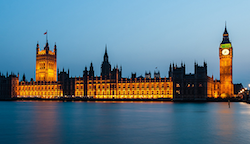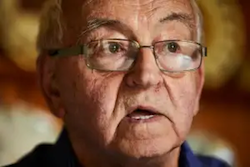Proportional representation is not the only answer to voter disengagement, argues JOHN CUNNISON. Compulsory voting, party primaries and a new parliament should also be part of a radically re-worked political system.
With politics and politicians held in such poor regard there is a real fear that public apathy and lack of engagement could lead to the election of an extreme, even fascist government. The recent local government elections have surely been a wake-up call and even the most stubborn defender of first past the post must now see that the two-party state is over.
 Many now see this as a time for proportional representation and believe one of the various possible PR voting systems would start to re-engage the public, even if it’s acknowledged that they’re not a silver bullet. But would it? I think not, and believe much more could be done to make ordinary people feel they were masters, not victims of a professional political class that seems irritated to have to consult them every four to five years.
Many now see this as a time for proportional representation and believe one of the various possible PR voting systems would start to re-engage the public, even if it’s acknowledged that they’re not a silver bullet. But would it? I think not, and believe much more could be done to make ordinary people feel they were masters, not victims of a professional political class that seems irritated to have to consult them every four to five years.
One change would be to make voting compulsory, as is it in Australia, which could begin to change attitudes. An election is far too important a business not to ensure everyone has had their say. Taxes are not optional, so why is voting? Why should a decreasing minority have to do all the work of deciding the country’s direction?
It should be a civic duty and part of being an active citizen to decide. Of course, there would be a “none of the above” option on ballot papers and, if more than 50% of the electorate selected it, the election would be re-run with new candidates. Automatic voter registration would be part of the system too, and people could even be asked to become registered supporters either of a party or an independent candidate.
Too often party machines are accused of selecting a candidate with no connection to their constituency. This could be overcome by having open primaries. If more than 5% of the electorate in a constituency were registered supporters of a party then they would be obliged to hold an open primary with all supporters involved in selecting its candidate.
Candidates would be nominated through the party’s own procedures, with compliance to ‘fair play’ overseen by a ‘political party certification officer’ (or PPCO), analogous to trade union certification officers. Their statutory role would be to ensure:
- All political parties have a written constitution and follow it.
- Parties conduct internal elections and disciplinary matters in line with democratic principles and their written constitution.
- Party funding is restricted to UK citizens only with a cap of £5,000 per person annually. Trade unions would be allowed to make donations based on the number of UK citizens who are members. Companies would be allowed to make donations based on the number of controlling, voting shareholders who are UK citizens. Institutions having shares would not be counted.
Perhaps this would ensure there are no more pop-up political parties run by companies while mainstream parties would no longer be able to manipulate contests to push their preferred candidates.
Parties with fewer than 5% of registered supporters could run candidates as independents. Each candidate would need the support of a minimum of 0.1% of the electorate, with the top five selected to run in a primary. There would be no need for deposits, as selection in the primaries would prove they were realistic candidates.
This could open up each race to a broader range of candidates, remove the financial bars to standing in elections, and reduce the chances of candidates being parachuted in above the heads of local people.
Control
None of this would be enough to give the electorate much control over their MPs once elected, however. With up to five years between elections, the public need to feel they are being listened to, that they are getting what they voted for, and that their representative is indeed working for them rather than acting as a well-paid member of an exclusive club.
One of the most irritating things politicians do is defect. This happens a lot at council level and usually results in the old party saying the defecting councillor should stand down while the new party says nothing. It needs to change.
If a person is elected for a party, they should remain in that party or stand down if they have a political change of heart. It should be enshrined in law that when an elected politician effectively resigns the whip, or adopts a new political affiliation, then their constituents can launch a recall petition. If they are suspended from their party, they would continue to sit. If they were expelled from their party under due process (overseen by a PPCO) they would be considered to have voluntarily resigned the whip.
Similarly, when an elected representative is reported to a standards committee there should be a quasi-judicial process where the complaint is put to a jury drawn from the constituency, with a guilty verdict and sanctions from loss of pay subject to a recall petition. The current system smacks of the political class marking their own homework.
The ‘gentleman’s club’ culture in Westminster also needs to change. In modern Britain, most people don’t have bars at work, and neither should parliament. The canteen should be similar to any other workplace canteen. MPs are well-paid, they shouldn’t need haute cuisine to do their work. Subsidies, maybe. Fine dining? No.
And then there is parliament’s location. London is remote from the lives of many voters and is currently being restored at an eye-watering expense. It’s time to move it (perhaps to Newcastle upon Tyne?) and to create a modern, purpose-built structure such as the Scottish parliament building in Holyrood. Why are politicians trapped in a building from the 1800s with a mindset to match?
All MPs should have accommodation in the parliament, owned by the state, as well as in their constituencies. And there should be electronic voting, allowing remote attendance, as well as workplace creches.
None of this will produce perfect politics – but maybe, just maybe, it will produce more relatable politicians.
—-
John Cunnison is a member of the area activists’ committee of Unite the Union and currently vice president of North Staffordshire Trades Council.


